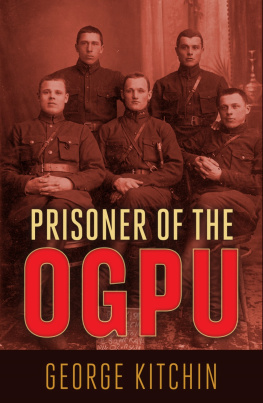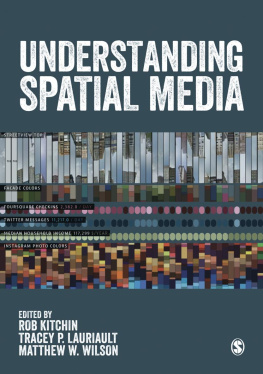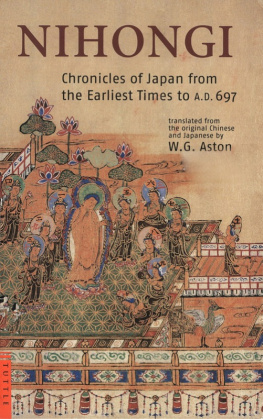Burtyrki Books 2020, all rights reserved. No part of this publication may be reproduced, stored in a retrieval system or transmitted by any means, electrical, mechanical or otherwise without the written permission of the copyright holder.
Publishers Note
Although in most cases we have retained the Authors original spelling and grammar to authentically reproduce the work of the Author and the original intent of such material, some additional notes and clarifications have been added for the modern readers benefit.
We have also made every effort to include all maps and illustrations of the original edition the limitations of formatting do not allow of including larger maps, we will upload as many of these maps as possible.
PRISONER OF THE OGPU
By
GEORGE KITCHIN
Prisoner of the OGPU was originally published in 1935 by Longmans, Green and Co. Ltd., New York.
Cover: OGPU functionaries, 1932.
* * *
Why should we hope? Our lives are wholly blasted,
And all of us are damned by destiny!
[From the prisoners song at the OGPU Northern Penal Labor Camps]
PREFACE
Stories of prison experience in Soviet Russia are not new. In fact the sordid details of nocturnal searches, incarceration in filthy jails, midnight inquisitions, and executions without warning have been made known to English readers through many personal accounts. But the narrative of the present author is unique in several respects and deserves a special place in literature descriptive of Russian conditions.
In the first place it gives the only firsthand authentic account of the penal camps of the Far North that has yet appeared. Two or three of those condemned to penal servitude in these camps have, it is true, escaped or been released, but in these cases their stay was brief and came at a time when for special reasons the severity of the regime was relaxed. The present author is the only man, so far as I am aware, who has undergone the actual experiences of these penal camps and lived to tell the tale.
George Kitchin is a gentleman of education and culture and an able and successful business executive. His social standing and business reputation were above reproach. The authenticity of his account is implicit in the narrative.
As will be seen in his story, he had the good fortune after a time to be assigned clerical work in the office of the penal camp administration. This undoubtedly saved his life and it also gave him a unique opportunity to observe the inner workings of the OGPU organization.
Perhaps the most noteworthy feature of Mr. Kitchins vivid narrative is the absence of violent partisanship. Despite the injustice of which he was a victim and the hardships to which he was subjected, the author in describing conditions in Russia and the operation of the Soviet system, treats the subject objectively and without bitterness. His attitude is that of a man caught up accidentally in the meshes of a vast impersonal machine, the operation of which he can observe and describe without rancor.
Mr. Kitchin, whose mother was English, was born in Finland. His English and American connections together with his Russian experience fitted him especially for his work in Russia as the representative of an American company, and at the same time enabled him to view conditions broadly and without the strong partisanship of the native Russian. As a citizen of Finland, his case was a matter of concern to the Finnish government, whose efforts finally obtained for him permission to leave Soviet Russia.
His physical condition after four horrible years can well be imagined. A year and a half were spent in convalescing, and another year in preparing his notes and writing the present volume. It is now offered to the public as a vivid narrative of personal experiences and as a contribution to the understanding of conditions in the Soviet Utopia.
JEROME LANDFIELD
As this book was being prepared for the press, news was received of the death in London of George Kitchin from pneumonia following complications which resulted from his privations in Russian penal camps.
1. THE NET
The doorbell rang in the dead of the night. It was an agent of the OGPU calling. He was accompanied by armed soldiers. The agent was polite, but taciturn. The soldiers stood there like statues.
The agent presented a warrant for search and arrest. The warrant had been issued by the counter-espionage department of the OGPU. What were they looking for? What did they want? The search was on. It lasted five hours.
I was in the living room, sitting by the fireside, while the search was being made. A soldier stood at the door and watched every move of mine. Luba was nearby, her eyes filled with terror. On my knee was our new-born baby, a tiny little being with violet eyes. A pink coverlet was wrapped around her, and she slept tranquilly through all those anxious hours.
Finally the search was over. Nothing incriminating had been found, as was to be expected. The OGPU agent stepped to the telephone.
Hello, hello. Is this the OGPU? Extension 76, please. Is that you? There is a new-born baby here, what am I to do? What? Six weeks old. What? His wife? But she is a foreign subject. What is it? Yes, yes, all right.
Lubas lips were pale, her hands trembled.
Will they take me, too? But how about Baby? she whispered almost inaudibly. There was something unforgettable in the expression of her eyes. I tried to calm her, to assure her that she had nothing to fear.
The agent hung up the receiver. There was a long pause.
Citizen, he turned to my wife, we shall leave you in peace, for the time being.
What a relief! The agent made out his report and we quickly signed it. I packed a few things. I lifted the little being that I had already learned to love.
Goodbye, little one.
The moment of parting came. There was Luba. And here was the dark stairway. I turned back for a last glimpse. Her silhouette was in the lighted doorway. Goodbye, my darling.
The steel-shod boots of the soldiers echoed as they struck the stone steps:
Goodbye, goodbye.
The clock in the prison office pointed to a quarter past five. In half an hour I had passed from freedom to jail, leaving behind me a series of grilled and locked doors. Here I was thoroughly searched. My necktie, belt, shoelaces and towels were taken away. It was the routine, to guard against attempts at suicide.
I was then led to a damp and dreary cell on the special fifth floor of the notorious Shpalernaya prison. Attached to the wall of my cell were a bunk and a small iron table with a seat. There was a window beneath the ceiling. Under the window was a toilet seat, and adjoining it an iron basin with a faucet.
I sat down on the bunk and tried to collect my thoughts. I was in the Shpalernaya, on the special floor where the OGPU kept only grave offenders. What did it mean? Why had they arrested me?
It was March 26, 1928. The seven years I had spent in Soviet Russia raced past me in swift review. I was a citizen of Finland, a business man, lured by the promises of the NEP (New Economic Policy) proclaimed by Lenin in 1921. I had started out as the representative of a Finnish group seeking a concession in Russia, and within a year developed an import business on a large scale.
My offices were then in the Finnish Government Building in Leningrad which housed many foreign firms. It was a building kept under special observation by the OGPU, which suspected every foreigner of being a spy. That did not worry me, as I had no connection whatever with espionage.











